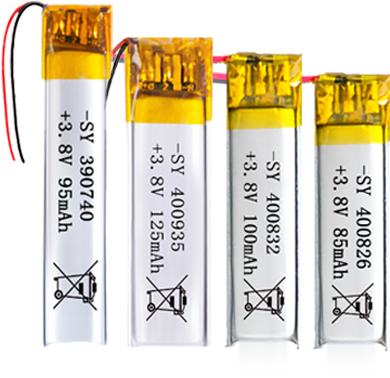Table of Contents
ToggleLithium-Ion Polymer Battery Care Guide

Lithium-ion polymer (LiPo) batteries1 power a vast range of modern devices, from smartphones and wearables to medical equipment and drones. Their high energy density2, compact design, and efficiency make them essential for portable electronics. However, proper care3 is necessary to ensure safety, longevity, and optimal performance.
Taking care of your lithium-ion polymer battery is crucial to prolong its lifespan, maintain performance, and avoid potential issues like overheating, degradation, and reduced capacity.
Let’s explore the best practices for maintaining and caring for LiPo batteries4, based on industry standards5 and our own manufacturing expertise.
Table of Contents
- Charge Your LiPo Battery Correctly
- Store LiPo Batteries Properly
- Avoid Deep Discharge
- Monitor Battery Temperature During Use
- Use Battery Management Systems (BMS)
- Regular Maintenance and Inspection
- Long-Term Storage of LiPo Batteries
- BMW Battery Technology
- Conclusion
BMW Battery Technology

Are BMW's Car Batteries Lithium-Ion or Lithium-Polymer?
Understanding the technology behind BMW’s battery systems6 can help in choosing the right power solutions for electric vehicles7 and battery-powered devices.
BMW primarily uses lithium-ion8 batteries in its vehicles. While lithium-ion and lithium-polymer9 share similarities, key differences make lithium-ion the preferred choice for BMW’s advanced vehicle lineup.
Why Does BMW Use Lithium-Ion Batteries?
BMW’s vehicles predominantly use lithium-ion batteries, particularly in models like the F80, F82, and F83. These batteries offer:
- High Energy Density – More power per unit weight and volume.
- Long Lifespan – Reliable performance over thousands of charge cycles.
- Enhanced Safety – Built with lithium iron phosphate (LiFePO₄)10 cells, known for stability.
- Efficient Battery Management System (BMS)11 – Regulates charge, temperature, and health.
- Fast Charging Capability12 – BMW integrates high-speed charging systems to reduce downtime for electric vehicles.
Lithium-Ion vs. Lithium-Polymer in BMW Vehicles

Lithium-Ion Batteries
- Uses liquid electrolyte13, providing superior energy density.
- Ideal for high-performance automotive applications14.
- Common in electric vehicles (EVs) and hybrids15.
- Better thermal stability, making them safer for large-scale automotive use.
Lithium-Polymer Batteries
- Uses solid polymer electrolyte16, making them more flexible in shape.
- Found in portable devices and some small EVs17, but less common in full-sized vehicles.
- Generally offers lower energy density compared to lithium-ion.
- More susceptible to swelling when overcharged or exposed to high temperatures.
BMW’s Battery Advancements
BMW continues to innovate in the electric vehicle sector, introducing solid-state battery research, improved fast-charging technology, and extended cycle life management systems. The automaker is actively investing in next-generation battery materials to enhance efficiency and sustainability.
Our Advice:
BMW’s choice of lithium-ion over lithium-polymer ensures greater efficiency, performance, and safety in their vehicle lineup. If you’re considering an aftermarket battery upgrade, ensure compatibility with BMW’s existing battery management system. Additionally, staying updated with BMW’s advancements in battery technology will help in making informed decisions about future EV investments.
Conclusion
Proper care and storage of lithium-ion polymer batteries ensure optimal performance and longevity. By following these best practices—proper charging, storage, temperature management, and using a BMS—you can extend battery life and improve efficiency.
BMW primarily utilizes lithium-ion batteries due to their superior performance, energy density, and long lifespan. While lithium-polymer technology has its advantages, lithium-ion remains the optimal choice for automotive applications.
At our company, we specialize in high-quality, custom LiPo batteries engineered for safety and durability. We help businesses maximize battery performance across various industries, from consumer electronics to medical applications. As battery technology evolves, we continue to stay at the forefront of innovation to provide reliable and high-performance power solutions.
-
Explore this link to understand the benefits and applications of LiPo batteries in modern technology. ↩
-
Learn about the significance of high energy density in batteries and how it impacts device performance. ↩
-
Discover essential tips for maintaining LiPo batteries to ensure their safety and longevity. ↩
-
Proper care for LiPo batteries is crucial for safety and longevity; explore expert tips to maximize their performance. ↩
-
Familiarizing yourself with industry standards can help ensure compliance and safety in battery usage and storage. ↩
-
Explore this link to understand the cutting-edge technology in BMW's battery systems, crucial for electric vehicle innovation. ↩
-
Discover effective power solutions for electric vehicles that can enhance performance and sustainability. ↩
-
Explore the benefits of lithium-ion batteries to understand why BMW chooses them for their advanced vehicles. ↩
-
Learn about the differences between lithium-polymer and lithium-ion batteries to see why BMW opts for lithium-ion. ↩
-
Explore the advantages of LiFePO₄ batteries, including their safety and longevity, to understand why they are a preferred choice in modern applications. ↩
-
Learn about the critical role of BMS in battery performance and safety, ensuring optimal operation and longevity of battery systems. ↩
-
Discover how fast charging technology enhances the convenience and efficiency of electric vehicles, making them more user-friendly. ↩
-
Explore the advantages of liquid electrolytes in batteries, including energy density and performance enhancements. ↩
-
Learn about the characteristics and requirements of high-performance automotive applications to understand their significance. ↩
-
Stay updated on the latest trends and technologies in EVs and hybrids, crucial for the future of transportation. ↩
-
Exploring this resource will provide insights into the benefits and applications of solid polymer electrolytes in modern battery technology. ↩
-
This link will help you understand the specific battery technologies powering portable devices and small EVs, enhancing your knowledge of their performance. ↩

